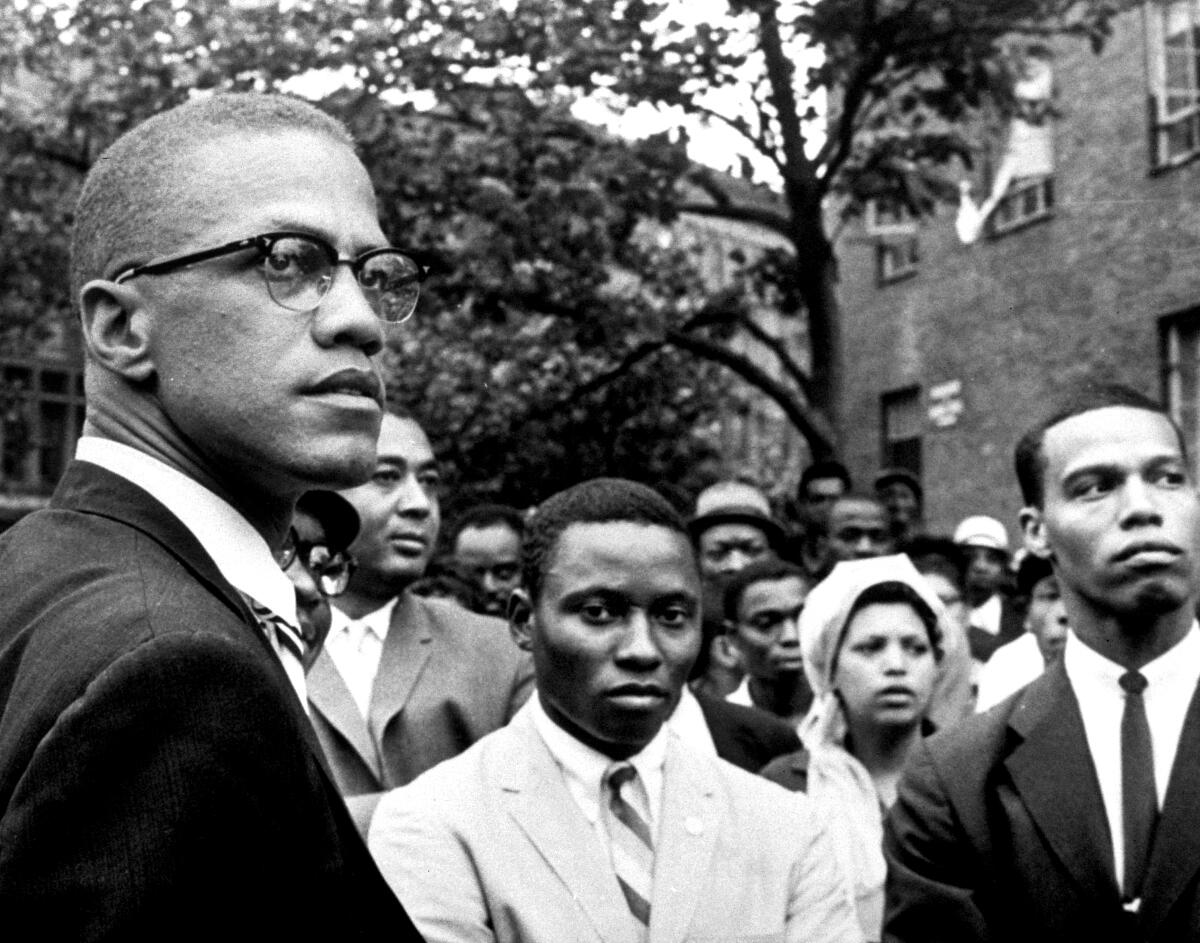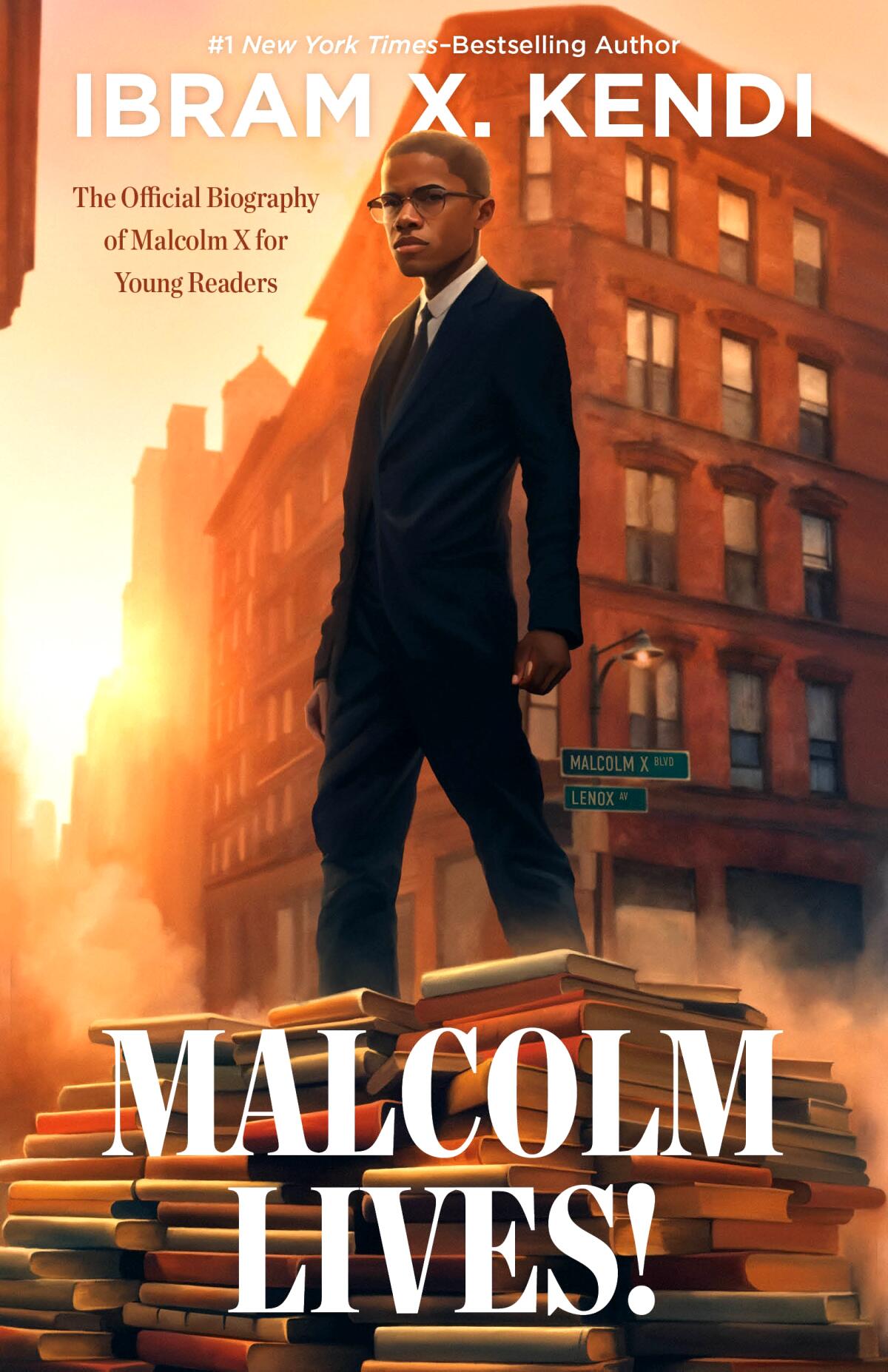Ibram X. Kendi is ready to introduce kids to Malcolm X: ‘Racism is worse in times of tragedy’

- Share via
On the Shelf
Malcolm Lives!: The Official Biography of Malcolm X for Young Readers
By Ibram X. Kendi
Farrar, Straus & Giroux: 400 pages, $20
If you buy books linked on our site, The Times may earn a commission from Bookshop.org, whose fees support independent bookstores.
At a time when the federal government is conducting a radical erasure of Black history in the name of fighting diversity, equity and inclusion programs, and school libraries are banning books about race, Ibram X. Kendi is ready to introduce kids to Malcolm X.
This shouldn’t come as a surprise. Kendi, whose new book “Malcolm Lives!” is subtitled “The Official Biography of Malcolm X for Young Readers,” has made it his mission to promote antiracism. His previous books include “How to Be an Antiracist” (2019) and “Stamped From the Beginning: The Definitive History of Racist Ideas in America” (2016), which won the National Book Award for Nonfiction. As an academic — most recently at Boston University and soon to be at Howard University — and as a writer, he lives to spotlight the very history that the current administration would like to bury, especially where it potentially influences young minds.
He is well aware of the timing of his new book. In fact, he savors it.
“When people are trying to attack history, trying to kill our awareness of history, those are the moments we should be creating it,” he said in a recent interview. “Those are the moments in which we should be making it even more legible for people, so that they can understand why other people are actually trying to prevent us from having an awareness of history.”

And in Malcolm X, the complex street hustler turned Black nationalist firebrand worshipped by everyone from Stokely Carmichael to Clarence Thomas, Kendi believes he has the perfect subject for the moment.
“Malcolm’s life and story, and the ideas that he personally wrestled with, are ideas that we’re wrestling with now,” he said. “I think he can help adults and young people to better understand what’s going on.”
Kendi — the “X” stands for his middle name, Xolani, a Xhosa and Zulu word for peace — pulls no punches in making such connections. This is how he analyzes the Lansing, Mich., fire department’s indifference after a white mob set fire to Malcolm’s family home in 1929: “Racism is worse in times of tragedy. If you are Black, the agencies designed to help you will ignore you or hurt you. Ask Black residents of New Orleans who survived Hurricane Katrina in 2005. Ask houseless Black people near you. Ask Black people who called the police when their loved one was having a mental health crisis — and the police came and killed them.”
In his new book about Malcolm X, Mark Whitaker deftly outlines the slain Black activist’s wide-ranging cultural influence and the resonance his words have today.
As Malcolm X’s centenary approaches on May 19, books about his life have been flowing fast, furious and by any means necessary. Two — Manning Marable’s “Malcolm X: A Life of Reinvention” (2011) and Les and Tamara Payne’s “The Dead Are Arising: The Life of Malcolm X” (2020) — won Pulitzer Prizes. Mark Whitaker’s “The Afterlife of Malcolm X: An Outcast Turned Icon’s Enduring Impact on America” arrives Tuesday.
“Malcolm Lives!” is different from the above in one obvious way: It is intended for readers between the ages of 10 and 14. It is disarmingly blunt and direct. Perhaps to the dismay of the censorious, it is also instructional.
In other words, it is a school library book banner’s worst nightmare.
“Malcolm has the ability to teach every young reader that no matter the challenges that they’re facing, the adversity that they’re facing in this moment, they have the potential and the capacity to become a great historical figure like Malcolm X,” Kendi said. “To me, that’s one of the most interesting aspects of his story. With everything he endured as a young person, he still was able to navigate everything and become this pivotal and influential figure.”

Kendi hopes “Malcolm Lives!” might find its way into the hands of readers not unlike the young Malcolm. As Malcolm Little, he was a petty crook who didn’t fully discover the power of reading until he was incarcerated — at which point he began devouring books like food. He memorized the dictionary. He studied Islamic texts and Black history. He read H.G. Wells, W.E.B. DuBois, Nietzsche and Kant. “He was a young person in prison heading nowhere,” Kendi said. “And it was books that led him to become the person that we know of to this day.”
So when Kendi approached the task of introducing Malcolm to today’s young readers, he thought about the impact “Malcolm Lives!” might have on someone encountering not just Malcolm for the first time, but exploring books for the first time. He knows books can unlock new worlds, which is one reason so many books, including those written by Kendi, have been banned. After all, it’s not the physical book that poses a threat, it’s the ideas contained therein and their capacity to provoke someone to think differently — and perhaps to hope.
As a new biography comes out, a look back at the history of Malcolm X histories, from ‘The Autobiography’” to Public Enemy to Manning Marable.
“When I think about putting this book in the world, I think about how this book can be the book that allows a Black child to realize that they are important, that they have potential, even if that child is incarcerated,” he said. “Or it could be the book that allows a white child to realize the problem isn’t Black people, which then prevents that white child from going down a path in which they end up harming a Black child and therefore harming their own sort of life chances.
“I mean, this is important work.”
More to Read
Sign up for our Book Club newsletter
Get the latest news, events and more from the Los Angeles Times Book Club, and help us get L.A. reading and talking.
You may occasionally receive promotional content from the Los Angeles Times.











